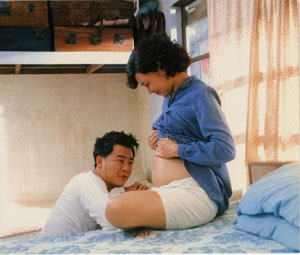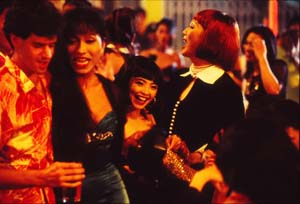Taipei Film Festival 2012 rewinds influential Taiwanese movies
By Psyche Cho Beyond their role as a recreational media, films also serve as a means of recording moments which will later become the collective memory of a generation. Moving into its 14th edition this year, the Taipei Film Festival 2012 casts a look at the past while envisioning a prosperous future. Copious programs involving gala premieres, the city in focus, panoramas and competition all interweave to create a charming look at the world of the silver screen, running from June 29 to July 21. Local feature GF*BF, directed by Yang Ya-che, will open the Festival the evening of June 29. Yang and the cast will attend the world premiere of GF*BF to help unveil the festival. GF*BF portrays the turbulent and rapid social change that has taken place during the past 30 years in Taiwan through the perspectives of three intimate friends struggling with their own complex relationships. It is Yang's latest work after winning the Best Director award in the Taipei Awards competition with Orz Boyz in 2008. In particular, this year happens to mark the 30th anniversary of the New Wave Cinema in Taiwan. Back in the 1980s the Taiwanese film industry was losing its edge due to the serious social atmosphere that existed under martial law as well as challenges brought by entertaining Hong Kong films that were introduced into the Taiwanese market. A series of movies under themes closely related to Taiwan's grassroots culture successfully led the deadlocked local filming industry out of its doldrums. The trend later became known as New Wave Cinema, an important milestone in Taiwan's filming history. One most representative work is In Our Time (1982), a tragicomic film consisting of four separate stories by four young directors – Chang Yi, Ko Yi-cheng, Edward Yang, and Jim Tao – that vividly portray the changing lives of the masses from the 1950s to 1980s. In Our Time will have its digital repair version world premiere July 19. Among the four directors, a retrospective on several masterpieces of Chang Yi is planned during the festival session. Born in 1951, Chang is widely considered a representative figure of New Wave Cinema in Taiwan. Jade Love (1984), a film adopted from Pai Hsien-yung's masterful novel of the same name, stars Loretta Hui-shan Yang, leading actress in several of Chang's popular films. In Jade Love, Yang acts as the young widow Yu-Chin who works for a rich family as a nanny. She kills her lover when finds him cheating on her with an actress. Yang's impressive acting won her the Best Actress Prize at the Asia-Pacific Film Festival that year. Kui-Mei, A Woman (1985) and This Love of Mine (1986), both were starred Yang as a tender and tolerant wife character, fully portraying the ideal woman figure in early Taiwan society. The former won her the highest accolades in the Taiwanese film industry for female leading actress in the Golden Horse Awards. The close cooperation between the two in their professional trade later extended to their private lives as they joined hands to found the crystal glass workshop Liuligongfang in 1987. The documentary Is Seeing Believing? (2012) goes deep into Chang's life and film career and the animated feature Black Bum, which is still in production. This year's City in Focus category focuses its spotlight on Stockholm, the capital of the Northern European county Sweden. An assortment of cinema delicacies embodying a selection of classic works, directors in focus, and contemporary films of Sweden are planned for local audiences. Looking at individual filmmakers, renowned director Roy Andersson is under careful study this year. He won overnight fame through his debut A Swedish Love Story (1970), an adolescent love story set in the background of a more complicated reality of grown-ups. After failing at the box office with his bold experiment Giliap in 1975, Andersson re-directed his professional career to advertising, shooting around 500 commercials over nearly 40 years. In 2000 he came back once again to stir up film circles with another best known film Songs from the Second Floor (2000). This piece depicts a restless city where an immigrant is brutally attacked, a loyal clerk is fired in a demeaning manner, and a magician fails to perform one of his easiest tricks. The film won the Jury Award at the Cannes Film Festival and is said to fully demonstrate his style, which is characterized by indoor settings, long takes and absurdist comedy. A total of six films including feature-lengths, shorts, and documentaries are planned under the category this year. Another director in focus is Ruben Östlund, who will bring The Guitar Mongoloid (2004), a mockumentary; Involuntary (2008); Incident by a Bank (2009), which won a best short award in 2010 Berlin Film Festival; and the opening film Play (2011) that swept awards in several major film festivals. In addition, 11 classics in various genres and themes and spanning the 1910s to 1970s are scheduled to screen that will serve as a window onto the culture of this northern European country for local audiences. Another highlight of the annual festival is the "Taipei Awards," which is designed for local filmmakers and encompasses four categories: narrative features, documentaries, shorts and animation. This year a total of 40 films out of 228 applicants will compete for the highest accolade, the NT$1 million grand prize. The line-up in the narrative features category includes the opening film GF*BF; Din Tao, a local box office sensation which earned more than NT$300 million earlier this year; LOVE, a multi-strand cross-strait romance featuring some of the most coveted A-listers in the Chinese-speaking world; and Starry Starry Night, which depicts two adolescents escaping from a heart-rending family crisis into a fantastical world. The results of the competition will be announced in the Taipei Awards Ceremony on July 21. The 2012 Taipei Film Festival runs till July 21. This year's panorama section embodies new talented directors worldwide, new voices from France, city visions, a window on Asian films, midnight fantasy and special screenings in addition to the 30th anniversary of Taiwanese New Cinema. Born in South Korea in 1985, Kim Kyung-mook demonstrated versatile talent in filmmaking field from a very young age as a director, screenwriter and commentator at the same time. He made his debut in 2004 with the autobiographic short Me and Doll-playing which explores gender identity. Kim continued to stun the filming circle with his first feature-length film Faceless Things the following year. The film incorporates three segments and serves as a fascinating, disconcerting examination of psychosexual alienation and self-exposure. Taipei Film Festival 2012 will offer a retrospective on Kim's works. Budding directors from another part of the world join to enrich the festival with an array of six new French films that will screen during the festival session.
Staff Reporter
Another opening film, Play by Swedish director Ruben Östlund, centers its plot on a series of absurd incidents as a gang of black youths terrorize rich children for their cell phones. Based on real events, the film scrutinizes the social and ethnic strata in Swedish society. Meanwhile, a retrospective of Östlund's past works will be presented in the "Director in Focus" section during the festival session. 30-year anniversary of Taiwanese cinema
30-year anniversary of Taiwanese cinema Under the spotlight: Stockholm
Under the spotlight: Stockholm Budding directors under the spotlight
Budding directors under the spotlight A Kaleidoscope of filmmaking worldwide
A Kaleidoscope of filmmaking worldwide

![Taiwan.gov.tw [ open a new window]](/images/egov.png)
